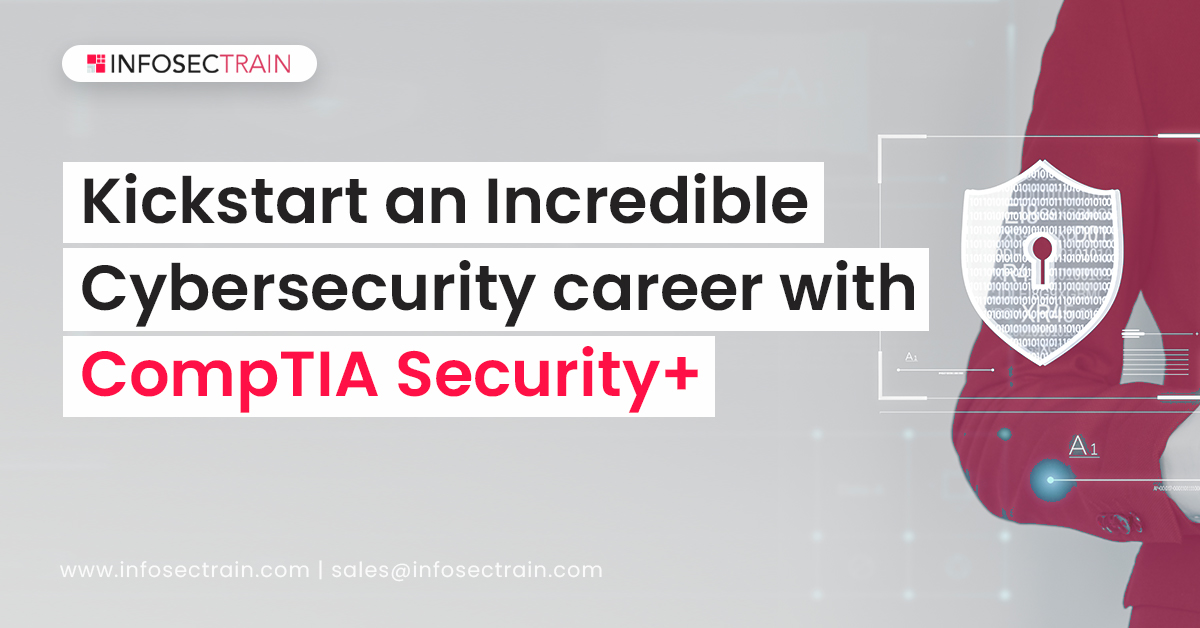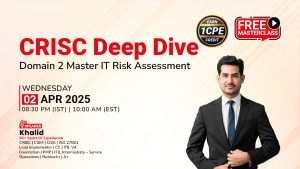Kickstart an Incredible Cybersecurity Career with CompTIA Security+
In this growing digital world, data breaches have become a part of our life. In fact, as per various global Information security reports, data breaches are happening every single day and every single minute in our lives! In circumstances like data breaches occurring every day and the vulnerabilities of the systems exposing, organizations must take a serious step towards protecting their data.

One of the best things organizations can do to protect their data is to hire cybersecurity professionals to detect and respond to the threats. As Cyber Crimes increase, the need for CyberSecurity professionals also increases. This means, if you are a Cyber Security professional, your employment is secured for a lifetime.
Every incredible journey has to start with a single step, and CompTIA Security+ certification is the first step to begin your Cyber Security journey.
After completing the CompTIA Security+ certification course, you will be able to:
- Understand the concepts of pen tests and vulnerability scanning; you will also learn to detect different compromises.
- You will be good at implementing public key infrastructure.
- Install and configure management controls, wireless security settings, and identity and access services.
- Install, configure, and deploy system designs and concepts of network architecture.
CompTIA Security+ Target Audience:
- Consultants
- Security engineers
- Network administrators
- Any technical professionals interested in information security
The CompTIA Security+ certification covers the areas like:
- Operational security
- Cryptography
- Application and host security
- Network security
- Threat detection and management
- Risk mitigation and management
- Threats and vulnerabilities
- Identity management
- Access control
Prerequisites:
The Security+ certification has no prerequisites imposed by CompTIA. There are no minimum age or educational qualifications, although CompTIA recommends that candidates have at least two years of IT administration experience with a security focus.
Remember that CompTIA Security+ is revised every three years to keep up with changing market demands. Renewals of certifications assist in guaranteeing that IT professionals have the abilities required for current cybersecurity roles.
1. System Administrator: A System Administrator is a professional who advises businesses on their internal security policies. System Administrators also assist businesses in identifying vulnerabilities that a cyber attacker might exploit.
The below are the responsibilities of a System Administrator:
- Analyze, troubleshoot, and resolve Information system issues
- Installs, upgrades, and patches the Operating Systems
- Configure, monitor, and optimize the performance
2. Security Administrator: A Security Administrator is tasked with installing, administering, and troubleshooting a company’s security systems. Security Administrators are also responsible for creating training materials and security rules for their coworkers.
The primary duties of a Security Administrator are:
- Incorporating the security needs into the systems
- Monitoring the traffic and responding to irregularities
- Installing security tools and firewalls
- Regularly performing security audits
3. Network Administrator: Network Security Administrators establish and apply a network security policy across the wider network. They are aware of potential threats and weaknesses, as well as protection strategies. They generally work with engineers to ensure that the entire network is secure.
The primary responsibilities of a Network Administrator are:
- Managing network security
- Repairs networks
- Implementing the required upgrades
- Optimizing and analyzing network performance
4. Help Desk Analyst/Manager: The Help Desk Analyst’s job is to guarantee that computers are working properly so that end users may complete their jobs. Receiving, prioritizing, documenting, and actively resolving end-user assistance requests are all part of this process.
The Help Desk Manager leads a group of technicians that troubleshoot and handle IT issues. He also ascertains that the help desk team is using the appropriate tools and technologies to detect, document, track, and address reported issues.
5. Cloud Engineer: The management of an organization’s cloud-based systems and procedures is the responsibility of cloud engineers. Setting up architectures utilizing cloud providers like AWS, Microsoft Azure, Google Cloud fall under this category.
The responsibilities of a cloud engineer include:
- Developing and executing rules for the usage of cloud services
- Handling requests for new technology
- Building a secure cloud environment
- Maintaining acceptable service availability, often known as uptime.
6. IT Auditor: IT Auditors are in charge of making sure that an organization’s IT systems and infrastructure function as smoothly as possible. According to CIO, they also ensure that all systems and technologies are compatible with essential security procedures.
7. IT Project Manager: An IT Project Manager, also known as an IT Project Leader, is a person who is in charge of implementing IT infrastructure and applications within a company. Project planning, resource allocation, and project implementation in accordance with the organization’s standards are the primary responsibilities of an IT Project Manager.
8. Information Security Manager: An Information Security Manager is in charge of safeguarding a company’s computers, networks, and data against computer viruses, security breaches, and hostile hacker attacks.
CompTIA Security+ with Infosec Train:
Infosec train is one of the leading training providers with a pocket-friendly budget. So, if you want to get a good grip on the CompTIA Security+ Certification course, then join us to experience an incredible journey with our industry experts. Our courses are available in live instructor-led and self-paced sessions, making it easy for you to take up and complete your learning/ training journey at ease. Join InfosecTrain to learn skills that can change your life.







 1800-843-7890 (India)
1800-843-7890 (India)